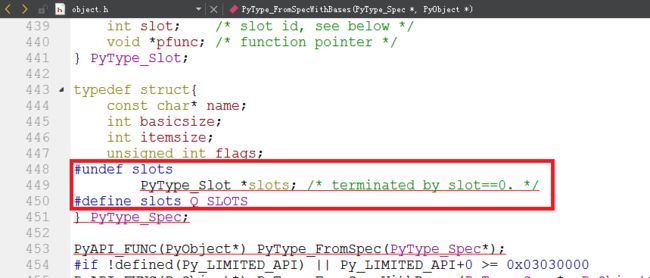Qt混合Python编程基本使用
打算用Qt做一个类似手机日历的Windows程序,使用聚合数据的api,返回json格式数据。尽管Qt可以处理json数据,还是打算调用Python。
pro文件添加以下内容
INCLUDEPATH += "C:\Program Files\Python36\include"
LIBS += "C:\Program Files\Python36\libs\python36.lib"
必须以Release方式编译。
编译时出现
C:\Program Files\Python36\include\object.h:448: error: C2238: 意外的标记位于“;”之前
错误。
参考http://www.cnblogs.com/jiaping/p/6321859.html http://www.cnblogs.com/findumars/p/6142330.html
把上述文件改为
Extending and Embedding the Python Interpreter — Python 3.6.5 documentation
https://docs.python.org/3.6/extending/index.html
Python/C API Reference Manual — Python 3.6.5 documentation
https://docs.python.org/3.6/c-api/index.html
上面两个链接是详细的官方文档,下面的代码实现调用无参数无返回值、有参数无返回值和无参数有返回值的Python函数。
mytest.py
def hello():
print("python mytest")
def arg_in(a, b, s):
print(a + b)
print(s)
def arg_out():
return 12, 34, "arg out str" Py_Initialize();
if (!Py_IsInitialized())
{
qDebug() << "python is not initialized";
}
else
{
QString str = "sys.path.append('" + QDir::currentPath() + "')";
PyRun_SimpleString("import sys");
PyRun_SimpleString(str.toStdString().c_str());
PyRun_SimpleString("print(sys.path)");
PyObject *pModule = PyImport_ImportModule("mytest");
if (!pModule)
{
qDebug() << "can not import python module file";
}
else
{
PyObject *pFun = PyObject_GetAttrString(pModule, "hello");
if (!pFun)
{
qDebug() << "can not get function";
}
else
{
PyObject_CallFunction(pFun, nullptr);
}
PyObject *pFun2 = PyObject_GetAttrString(pModule, "arg_in");
if (!pFun2)
{
qDebug() << "can not get function";
}
else
{
//PyObject* args = Py_BuildValue("(ifs)", 100, 3.14, "arg in str");
PyObject *args = PyTuple_New(3);
PyObject* arg = Py_BuildValue("i", 100);
PyObject* arg2 = Py_BuildValue("f", 3.14);
PyObject* arg3 = Py_BuildValue("s", "arg in str");
PyTuple_SetItem(args, 0, arg);
PyTuple_SetItem(args, 1, arg2);
PyTuple_SetItem(args, 2, arg3);
PyObject_CallObject(pFun2, args);
}
PyObject *pFun3 = PyObject_GetAttrString(pModule, "arg_out");
if (!pFun3)
{
qDebug() << "can not get function";
}
else
{
PyObject* pRet = PyObject_CallObject(pFun3, Py_BuildValue("()"));
int a;
int b;
char *s;
PyArg_ParseTuple(pRet, "iis", &a, &b, &s);
qDebug() << a << b << s;
}
}
}
Py_Finalize();
